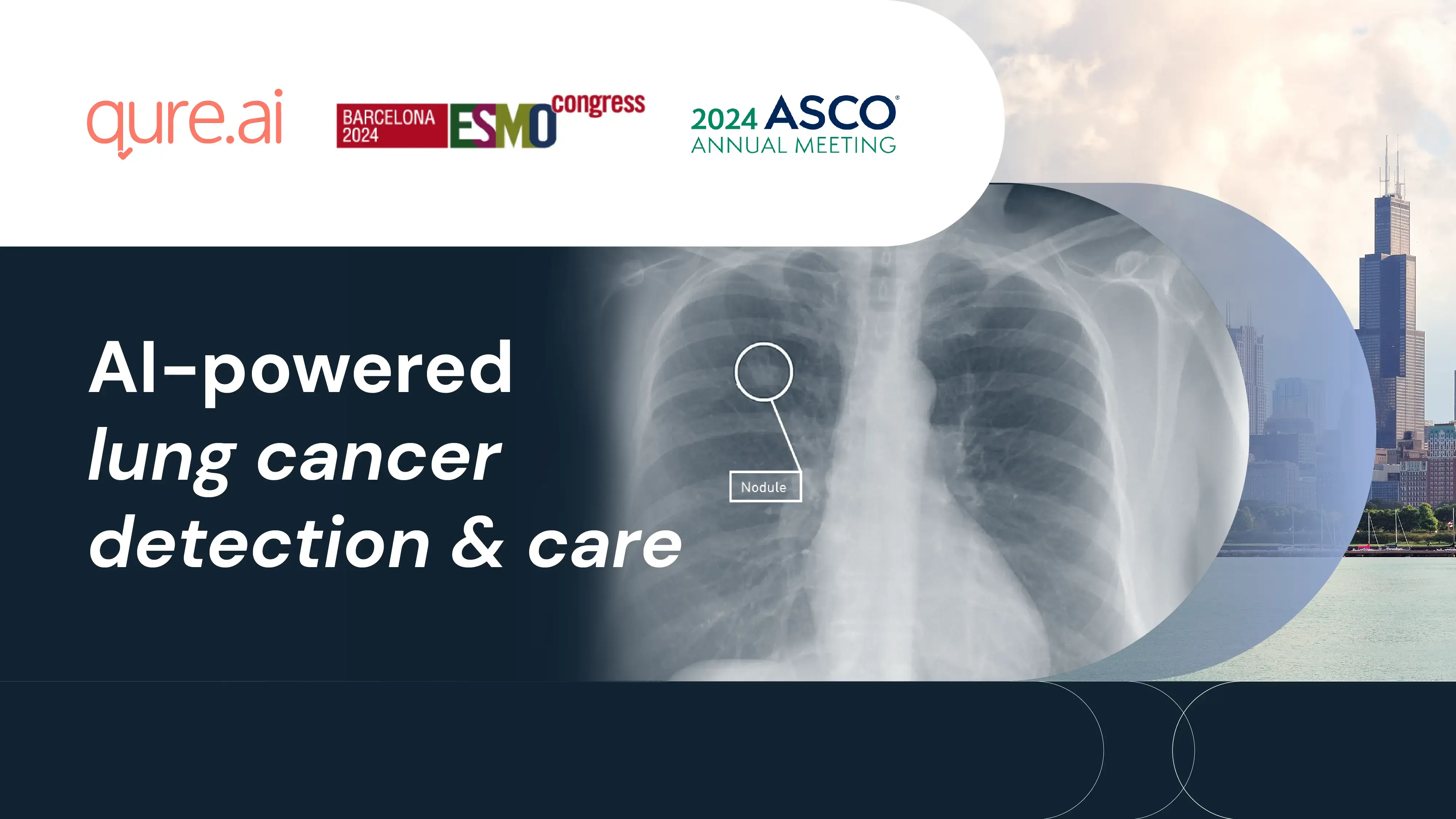Lung cancer is the leading cause of cancer-related deaths worldwide, with approximately 75% of patients detected in late-stage disease. A later diagnosis means that the opportunity for therapeutic or surgical intervention is low, and survival is limited. However, early detection has the potential for improved survival, over 90% if treatment starts at cancer stage 1.
Back
Traditional lung cancer screening initiatives have helped tackle rising cancer rates since their inception, but calling specific patient cohorts for screening based on age or smoking history is only part of the lung cancer detection jigsaw.
Casting the net wider in lung cancer detection
AI can be a highly accurate tool for opportunistic lung cancer surveillance. According to a study published in the journal Diagnostics, Qure’s qXR chest X-ray solution achieved a high negative predictive value of 99.8% for detecting lung nodules. It also demonstrated an impressive 91.5% AUC (Area Under Curve) score for identifying lung nodules, showcasing its potential to accurately detect early signs of lung cancer from routine X-rays.
AI to inspire the redesign of patient pathways
A partnership between Qure and AstraZeneca, the global biopharmaceutical company, has made considerable progress in the fight against lung cancer on a global scale. This collaboration is testament to the transformative potential of AI, innovating beyond traditional lung cancer screening profiles and improving patient outcomes on a large scale. It's a glimpse into the future of healthcare.
Nipun Jain, Head of International A.Catalyst Network at AstraZeneca states, "Our partnership with Qure.ai represents a critical step in our commitment to the EDISON Alliance's 1 billion Lives Challenge. Lung cancer remains a major global health concern, and it is through applying AI to screen for lung cancer risk in millions of routine X-rays, that it will provide a low-cost, high-impact way of ensuring at-risk patients enter the right diagnostic and care pathway. This milestone exemplifies our A.Catalyst Network approach to expanding access to digital healthcare and driving sustainable change in the communities we serve."
Initial findings of RADICAL, a pioneering UK AI-powered trial to diagnose lung cancer earlier from GP or primary care physician referred chest X-rays in an outpatient hospital setting, have also shown much to be optimistic about. Time to treatment turnarounds have reduced from 64 days to 25 by triaging chest X-rays with AI and referring patients for a CT scan within 24 hours. This saves considerable time to potentially improve patent outcomes and quality of life.
Professor David Lowe, Professor of Health Innovation at the University of Glasgow and Emergency Consultant at NHS Greater Glasgow and Clyde in Scotland states, “Worldwide healthcare systems have a significant challenge in the detection of lung cancer. At present, nearly 50% of patients present with advanced or stage 4 cancer, leading to poorer outcomes. If we can spot cancer earlier, by speeding up the time and accuracy of the 100,000 chest X-rays performed each year with our study at NHS Greater Glasgow & Clyde, we can improve time to further imaging, and subsequent treatment. AI will help orchestrate benefits for the whole patient care pathway.”
AI to optimize oncology clinical trials and care
There is much potential for AI to also push the boundaries in clinical oncology care, research and pharmaceutical drug development / trials.
Recently, Qure.ai and Project Data Sphere, a nonprofit initiative of the CEO Roundtable on Cancer, announced a partnership to augment tumor assessments using AI. The collaboration aims to increase efficiency and consistency in evaluating the effectiveness of cancer treatments. The focus of the collaboration is ‘autoRECIST’. It will address the critical need for automating and standardizing tumor response assessments. Initiated in consultation with the US FDA and stakeholders from across the pharmaceutical industry and academia, it will aim to enhance cancer treatments and research.
AI for discussion at ASCO & ESMO 2024
Qure’s end-to-end AI-powered lung cancer care portfolio includes CE and FDA certified solutions to support the early identification, precise measurement, efficient management and monitoring of lung nodules. These help to address critical gaps in healthcare plus propel developments in the pharmaceutical or life sciences industry.
For example, the AI solution qXR-LN (lung nodule detection) has FDA clearance for identifying and localizing lung nodules on chest X-rays. It also shows malignancy-risk scores and can serve as a crucial second reader for physicians, assisting in the review of frontal chest radiographs to assist with referral into CT pathways. In a study involving 40 sites across the United States, qXR-LN achieved an impressive AUC of 94% for nodule detection.
As the global oncology community converges on Chicago then Barcelona to share and discuss the latest clinical cancer research and innovations impacting patient care at the 2024 American Society of Clinical Oncology (ASCO) meeting, 31 May to 4 June and European Society for Medical Oncology (ESMO), 13 to 17 Sept, opportunities for AI abound. Early detection and treatment advances using digital health innovations will drive research techniques and improve patient quality of life – and this matters in the global fight against lung cancer.
